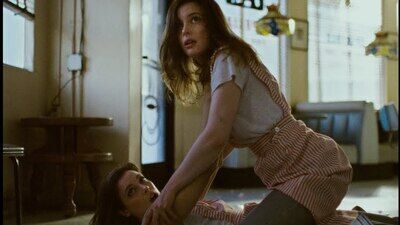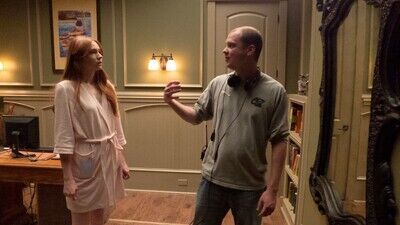Best in show is a tie between Bomo Illuma’s segment, in which Jane meets an ex-lover named Tayo (Chido Nwokocha) on a beach where, ten years earlier, it became painfully apparent that racial and cultural differences (she’s white, he’s Black) were fated to prevent them from going the distance; and Jeong’s segment, which reunites Jacobs with “Community” castmate Joel McHale as another of Jane’s former flames. Illuma’s deployment of different textures, colors, and lighting schemes to contrast past and present evokes the work of Barry Jenkins, and it’s remarkable how much agonizing detail the segment manages to impart about the reasons for the couple’s failure without spelling anything out. Much of the dramatic heavy lifting is done through closeups of Jacobs and Nwokocha, and by Alex Krispin’s score, which serves as an endoskeleton for the entire project, though it’s too subtle to proclaim that aspect of its function.
Jeong’s segment is the polar opposite: McHale’s character meets the heroine on a hiking trail, leading to a walk-and-talk that feels like this film’s answer to Richard Linklater’s series of “Before” movies. Its centerpiece is a nearly six-minute, unbroken shot of the characters talking about past mistakes and regrets, scrubby hills behind them. The dialogue is cringey in the way that earnest conversations between exes tend to be. It’s as embarrassing and touching as a confessional exchange overheard in public. Jacobs and McHale had scorching comic chemistry on “Community,” and Jeong surely drew on his familiarity with them as both artists and people. But there’s more going on here than fan service. Both performers show sides of their talent that “Community” never tapped. And there’s a raw vulnerability to both that’s disarming.
Did I like “The Seven Faces of Jane”? I love the idea of it, I love that it exists, and I’m not sure how much I can ultimately say for or against it, considering that everything good and bad is baked into the methods that the performers and filmmakers committed to. Reviewing a film this unusual, uninterested in playing by conventional rules, and devoted to the concept of freedom (damn the consequences) is perhaps like reviewing a game of charades. Most of the time, it’s just a game, something you do to pass the time with friends. But every once in a while somebody pulls a title from the hat and acts it out with such virtuosity that you feel like handing them an Oscar. Too bad it’s not possible on this platform to give each segment of an anthology its own star rating. If there were, Jeong and Illuma’s segments would get three-and-a-half stars. The rest run the gamut from a half-star to two: you’ll know them when you see them.







Leave feedback about this